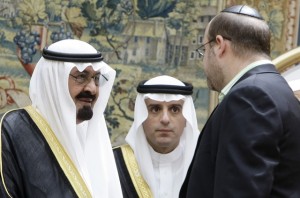Mecca Conference Promotes Dialogue Between Muslims and Followers of Other Faiths
June 12, 2008
Washington DC
Religious leaders and Islamic scholars from more than 50 countries gathered for an international conference in Mecca last week to address the challenges facing the Islamic world. The conference was part of a recently announced initiative by Saudi King Abdullah to promote dialogue between Muslims and followers of other monotheistic faiths.
King Abdullah’s tone was one of reconciliation between Islam’s two main branches, Sunni and Shi’a. The King, a Sunni Muslim, was reported to have entered the hall with a leading Shi’a politician, former Iranian President Akbar Hashemi Rafsanjani, who later sat at his left in a gesture of unity. Ibrahim Hooper, communications director for the Council on American-Islamic Relations in Washington, attended the three-day conference in Mecca. He says King Abdullah’s call for dialogue will have reverberations throughout the Muslim world. Mr. Hooper explains that the King’s plan has two major elements – first, to begin an intra-faith dialogue to reach a point where Muslims can speak with one voice, and second, to launch an inter-faith dialogue with non-Muslims, especially Jews and Christians. Speaking with host Judith Latham of VOA News Now’s International Press Club, Mr. Hooper says the dialogue was less about theological issues than about working together on “common principles and values.”
Pakistani journalist Akbar Ahmed, a former ambassador to Britain, is the chair of Islamic Studies at the American University in Washington, DC. He calls the convening in Saudi Arabia of a conference on interfaith dialogue “hugely significant,” partly because it is home to Islam’s two holiest places, Mecca and Medina. Therefore, he says, it is likely to have an impact on the “rest of the world in a very direct way.” But, Professor Ahmed says the next step must be “more than a conference,” adding that it needs to include translations of each other’s sacred texts, visits to sacred places, and an “exchange of genuine concern and ideas,” without avoiding difficult issues. He notes that, “whether we are Abrahamic or non-Abrahamic,” we all face a world confronting global warming, global poverty, and starvation in many places.
But Saudi journalist Ali Al-Ahmed, director of the Washington-based Institute for Gulf Affairs, is more skeptical about the value of the Mecca conference. Although calls it “a good step,” he says the conference was a failure in its lack of inclusiveness. Mr. Al-Ahmed says it excluded the Ismaili Muslims, who represent about a million Saudi citizens. He says Sufis were not invited, nor were the Almadiyah Muslims. Furthermore, Mr. Al-Ahmed says, Shi’a Muslims around the world were “severely under-represented.” Until there is a conference that brings everybody in and “acknowledges the diversity of the Muslims,” he adds, it will be “just another PR [public relations] event.”
Ibrahim Hooper notes that the tradition of dialogue has its roots in the Qur’an and in early Islamic history. The final communiqué of the conference, he points out, shows clearly that dialogue is an “established procedure,” not only by the Prophet Muhammad but also by “all the messengers of God throughout history.” In fact, the final communiqué mentioned the history of dialogue with the Christian community in Medina at the time of the Prophet, which is known as the “Compact of Medina.”
Akbar Ahmed agrees that last week’s conference in Mecca links Islamic tradition with the essential role that interfaith dialogue plays in addressing some of mankind’s most urgent contemporary problems. As he says, for Muslims, everything derives from the Qur’an. Professor Ahmed says he believes the interfaith movement is “rooted in a Qur’anic vision,” and otherwise the King of Saudi Arabia, “a very pious man himself,” would not have organized a conference in Mecca.
At the same time, the journalists and scholars point out that freedom of religion does not exist in Saudi Arabia. Saudi journalist Ali Al-Ahmed says he hopes that one day Jewish rabbis, Catholic priests, Hindus and Sikhs, and Buddhist monks can travel to Saudi Arabia and meet with Muslim religious leaders “in the open and in front of television cameras.”


















